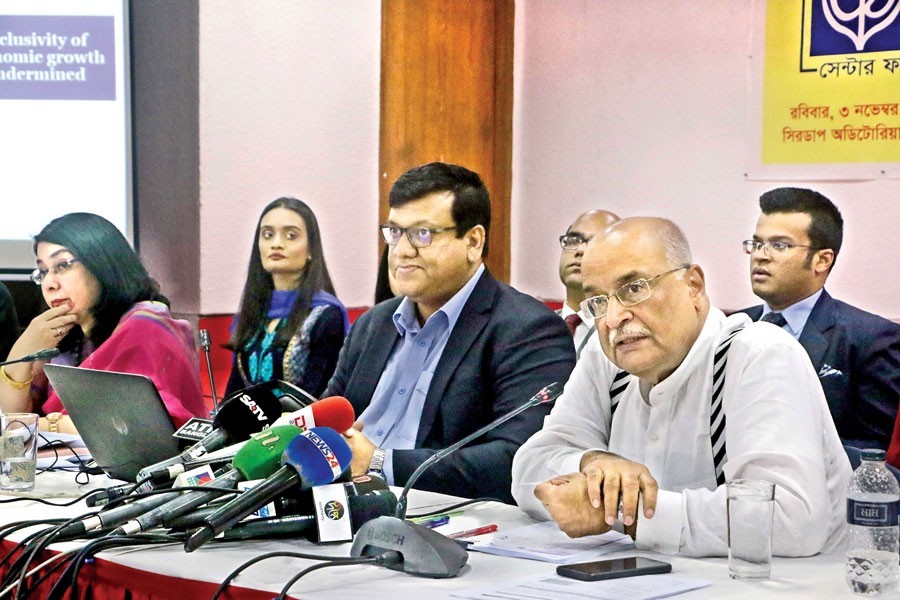The country's macro-economy is now dependent on public investment meant for building mega projects, said local think-tank Centre for Policy Dialogue, or CPD, on Sunday.
The CPD said such type of economic management has weak relation to private investment, revenue mobilisation, monetary policy and even trade policy.
Terming such a system "one policy centric" its distinguished fellow Dr Debapriya Bhattacharya said for this reason, the ministry of finance cannot play its due role in implementing the budget.
He said currently, policies are being formulated on an 'ad-hoc' basis and the decision making is fully centralised.
Under such circumstances, some plunder bank money, some are involved in capital flight while others are evading taxes.
He said private investment has stagnated at around 23 per cent for years but the economy is expanding fast.
Also, the private sector credit growth dipped to a record low in August, he said.
"This (economy) is like a kite [flying] without thread…"
"This means that the reality is totally different from that of government statistics," he said.
He made the remarks while addressing a press conference on the "State of the Bangladesh Economy in FY'2019-20", in the city's CIRDAP auditorium.
Expressing concern over the budget implementation, the CPD said the government should focus immediately on four areas: revenue mobilisation, banking sector, capital market and balance of payment, or BoP.
Defaulted loans in the banking sector are on the rise at a time when the capital market is going through difficult situation, Dr Bhattachariya said.
The import of capital machinery, which has a direct link with industrial production, has also decreased, he said.
The CPD noted that for the first time since fiscal year 2010 the growth of exports in the first quarter turned negative.
Speaking at the function, CPD executive director Dr Fahmida Khatoon said the decline in private sector credit growth, mounting liquidity stress, unsuccessful cap on interest rate, etc have been raising difficulties in the banking sector.
She said rising non-performing loans, wholesale loan rescheduling and writing off, worryingly inadequate capital in certain banks and futile recapitalisation of banks have compounded the banking sector woes.
Dr Khatoon said the banking assets in relation to GDP (gross domestic product) remained 56 per cent, which is lower compared to other developing nations.
She said the malaise of the banking sector is due to the lack of governance and accountability, mainly at four levels such as Bangladesh Bank, the ministry of finance, commercial banks and the judiciary.
Prof Mustafizur Rahman, distinguished fellow of the CPD, said for the first time since 2011, the overall balance of payment (BoP) of the country was negative in FY'18 (US$857 million).
For the first two months of FY'20, it was $139 million, which was $156 million in the same period of FY'19.
He said export also witnessed a negative growth during the first three months of the FY'20, which is worrisome.
The early signals during FY'20 also indicate continuation of these trends.
If all these trends continue over the rest of FY'20, the overall balance, forex resources and exchange rate will come under increasing pressure.
"In view of this, maintaining competitive exchange rate, reversing the negative export trend and ensuring robust flow of remittances and replenishing the forex resources will be required to maintain a healthy BoP while ensuring overall macroeconomic stability," he said.
The government should depreciate its currency to keep pace with its counterparts to remain competitive in the export market, Dr Rahman said.
Referring to an earlier study, CPD senior research fellow Towfiqul Islam Khan said more than 7.0 million potential taxpayers in Bangladesh are out of the tax net.
The government will have to take concrete and more visible actions to broaden the tax net, he said.
Research director at the CPD Dr Khondaker Golam Moazzem said the capital market is yet to become an alternative source of income.
He said weak institutions and weak governance are the key challenges for the market.
"A vested quarter is getting benefit under the very nose of the regulator," he said.
He was critical of the poor quality of IPOs and the abnormal rise in prices of "Z" category shares.


